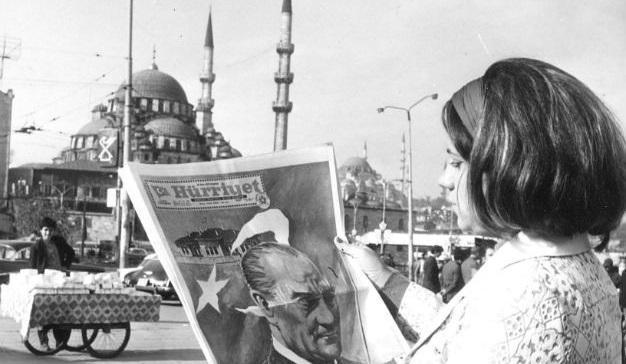INTERVIEW: Historian Ryan Gingeras on Atatürk as ‘heir to the Ottoman Empire’
William Armstrong - william.armstrong@hdn.com.tr

An Istanbul local holds a copy of daily Hürriyet on the 50th anniversary of the Turkish Republic, on Oct. 29, 1973.
The legacy of Mustafa Kemal Atatürk is still bitterly contested in today’s Turkey. Approaching the centenary of the republic’s establishment, the process of Westernization, secularization and modernization led by Turkey’s nationalist founding father still provides the reference against which various political movements – whether sympathetic or antagonistic - define themselves.Ironically, Atatürk’s most ardent admirers and fiercest detractors both suggest the Kemalist project came as a bolt out of nowhere. In fact, scholars have in recent years emphasized historical continuities from the late Ottoman to the republican periods.
A new title by Ryan Gingeras, associate professor at the Naval Postgraduate School, is the latest book to make that case. At 200 pages, “Mustafa Kemal Atatürk: Heir to an Empire” (reviewed in HDN here) fills a surprising gap in the market for a relatively short biography on Turkey’s founder and is an excellent introduction to the subject.
Gingeras spoke to the Hürriyet Daily News about what he learned researching Atatürk’s life and times a century on.
Mustafa Kemal was born in Salonica, Thessaloniki in modern Greece, probably in 1881. But his early life is very thinly sourced. What are the main challenges for a historian researching this period of his life?
If you look at almost any major political figure from the late Ottoman Empire, it's almost impossible to tell the story of their youth. One of the points I make in the book is that we only begin to get a handle on Mustafa Kemal's youth by the time he's already famous. He gives a very well-known interview in winter 1922, by which point he's already a person of note in world politics. It's very clear at that moment that he's already beginning to shape his own biography and is thinking in terms of his legacy. So you have to take any anecdotes related to his early life with a big pinch of salt.
There's a deep imperative among biographers and those who are interested in Atatürk to know about his youth, to know about the foundations that made him who he was. But it's almost impossible to say who he was as a young man in anything like impartial terms.
You insist that it’s more important to understand Mustafa Kemal in his historical context than to come down on either side in judgement. It seems to me that is something both his critics and his admirers have always failed to do.
People at the top of the field who study the history have now gotten behind this monolith and look at him within his context. After his presidency there was a desire to place him as the chief architect or engineer of the politics and culture of Turkey. But with distance people have now begun to put the equation back in its rightful order - looking at how the culture, the context, and the conditions shaped the individual. If you look at anything written on him in the last 10 years or so, this is how historians have done it.
 The book is subtitled “Heir to an Empire.” Historians have in recent years emphasized the big continuities from the Ottoman to the republican periods. Atatürk’s reforms were a radical break and a radical new beginning, but they were often built on foundations that went back decades into the Ottoman period.
The book is subtitled “Heir to an Empire.” Historians have in recent years emphasized the big continuities from the Ottoman to the republican periods. Atatürk’s reforms were a radical break and a radical new beginning, but they were often built on foundations that went back decades into the Ottoman period. In some ways it’s just a nuance, but it's a really important nuance. There’s good reason to think of the Atatürk period as both a break and a continuation. I like the idea of thinking of him as an heir, because if there's one thing that's definitive in his mind about this period, and one thing that makes his life significant, it is that the empire has ended and he is the clear transitional figure from the end of one state to the beginning of a new state.
If you look at what scholars have generally been doing - not just on Atatürk but on Turkey in general – they have been trying to tease out how the people and ideas that shaped the end of the Ottoman Empire linger into the early republic. Atatürk is the premier example of that.
What do you think are the most important continuities between the two?
First and foremost, the late empire begets a political perception this is very statist. The preservation of the state at the expense of society acts as an engine or framework around which so much of politics revolves.
The idea of the unitary, uncompromising state is at the center of all political debate.
The second obvious thing is that if you look at many of these personalities in Istanbul and Ankara, including Atatürk himself, there are a lot of continuities between the Ottoman and republican eras. There are historians who would actually call the early republican era a continuation of the Young Turk era, beginning in 1908 and starting to come to an end with Atatürk's death in 1938. I’m not sure I totally assign myself to this idea, but clearly people like Atatürk or Ziya Gökalp transcend the two eras.
There’s also a discussion about the content of the nation: What does it mean to be an Ottoman and what does it mean to be a Turk? That question plays itself out throughout this period - but I’d suggest it becomes more clearly framed after 1923.
The Committee of Union and Progress, or Young Turk, regime was in power through the First World War, essentially after 1908. Because he wasn’t part of its senior cadre Mustafa Kemal wasn’t tainted by the disgrace that others attracted during the war. In fact he was very critical of senior Young Turks like Ottoman War Minister Enver Pasha, which gave him crucial political capital in the years after 1918. The Kemalist era defined itself in opposition to the discredited CUP, but in many ways it had a similar modernizing, centralizing worldview.
There is a set of diary entries and letters that are among the few writings by Mustafa Kemal we have from before he achieved great fame. Among the topics in these writings are his political frustrations and aspirations. It's clear that he saw himself as someone suited for greater authority than he had. It's also clear that he was a real political infighter. To get what he wanted, he didn't hesitate at all to go above the chain of command or to circumvent people of greater authority.
It's ironic that he eventually used his relatively marginal political stature within the late Ottoman government as a weapon - not just against individuals who were his political superiors during the war but also later in consolidating his power in the Turkish Republic. He used his antagonism toward the wartime leadership in Istanbul as a way to underline the inability of the Young Turks to rule. In order to consolidate a far more regimented and personalized rule over the republic, he used the idea that the Young Turks didn't just rule poorly but also handled things incompetently. One thing we know about the Young Turks is that they were a highly factionalized group of people. The party itself was deeply fractured along personal lines and leadership in the war was rather incoherent. In contrast, Atatürk said there would no longer be this kind of incoherence; there would be a clear sense of who was in charge, who was making policy, and how that policy would be executed.
The Turkish Republic, more than most other countries, was forged in flames – from the Balkan Wars starting in 1912, to the First World War, and then the War of Independence. No corner of Anatolia was left unscathed by violence over 12 years of continuous war. How important was this sense of exhaustion in allowing Atatürk to push through some of the more controversial early reforms?
There's a demographic fluidity that also has to be taken into account. The number of people displaced or killed was very large, while the number of newcomers who had come into the country - even after the republic was established – was also large. There was a big internal disruption throughout the country. So not only was resistance reduced dramatically after the war, there was also an opening to create a new political culture because so many people were living within new confines, new regions, new cultures. That provided an opportunity that didn't really exist before 1912.
What about the legacy of this early republican period under Atatürk? What things can we recognize in Turkish politics today that we can trace back to that Kemalist era, both negative and positive?
The first great legacy is how important leadership and the personality of the leader is in politics. We tend to think about Turkey in terms of periods, breaking down different eras along the lines of the dominant political personality of the era - whether it's Atatürk, İsmet İnönü, or Adnan Menderes. There was an intermediary period from 1960 to 1980, and in the 1990s, when there was an absence of a dominant figure. But now there is the contemporary period under Erdoğan since 2003. Personality is very important to how people think about politics.
Another legacy is obviously the very principle of being Turkish. The centrality of the language and the centrality of the land of Anatolia as critical to being Turkish is still fundamental to contemporary political and social life in Turkey. The political culture, in terms of the things that are celebrated but also many of the anxieties, are born in this era. Many of them come from things Mustafa Kemal himself talked about regularly; the celebration of the greatness of the Turk, and Turkey being a central and important country in the making of world civilization and history are tropes that still endure. There's also the idea of independence: The idea of the insolubility of the Turkish state and the Turkish nation are things that people still debate today.
*This and other interviews are available on the Turkey Book Talk podcast. Subscribe via iTunes here or Podbean here.
















